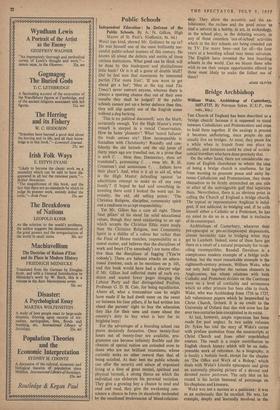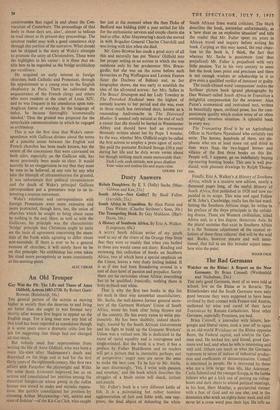Bridge Archbishop
THE Church of England has been described as a 'bridge church' because it is supposed to stand
between Catholicism and Protestantism and even to hold them together. If the analogy is pressed it becomes unflattering, since people do not usually live on bridges: At most, they pause for a while when in transit from one place to another, and instances could be cited of ecclesi- astical travellers who have done precisely that.
On the other hand, there are considerable sec- tions of English churchmen to whom the idea of being a bridge church is anathema. So far from wanting to promote peace and unity be- tween Catholicism and Protestantism, they deem themselves to be firmly entrenched on one side or other of the unbridgeable gulf that separates them. Nevertheless, there is an obvious point in calling the Church of England a bridge church.
The typical or representative Anglican is indul- gent, if not addicted, to bridging and, if he calls
himself either a Catholic or a Protestant, he has no mind to do so in a sense that is exclusive of its counterpart.
Archbishops of Canterbury, whatever their pre-episcopal or pre-archiepiscopal dispositions, almost inevitably take to bridging when they get to Lambeth. Indeed, some of them have got there as a result of a natural propensity for recon- ciling incompatibles. Randall Davidson is a conspicuous modern example of a bridge arch- bishop, but the most remarkable example is the eighteenth-century primate, William Wake, who not only held together the various elements in Anglicanism, but whose relations with both Catholic and Protestant divines on the Continent were on a level of cordiality and seriousness which no other primate has been able to reach.
Wake, who was Archbishop from 1716 to 1737, left voluminous papers which he bequeathed to Christ Church, Oxford. It is no credit to the University of Oxford that this rich mine has for over two centuries lain unexploited in its midst.
At last, however, ample reparation has been made for past neglect. In two noble volumes Dr. Sykes has told the story of Wake's career with profuse quotation from the manuscripts at Christ Church and from other unpublished sources. The result is a major contribution to English church history which will be an indis- pensable work of reference. As a biography, it is hardly a bedside book, except for the chapter on 'The Office and Work of a Bishop,' which deals with Wake's Lincoln episcopate and gives an extremely pleasing picture of a devout and devoted pastor pastorum. The only blot on his record is his lavish bestowal of patronage on his chaplains and kinsmen.
Wake was not a success as a politician: it was as an ecclesiastic that he excelled. He was, for example, deeply and learnedly involved in the
controversies 'that raged in and about the Con- vocation of Canterbury. The proceedings of that body in those days are, alas!, almost as tedious to read about as its present-day proceedings. The amateur reader may with a good conscience skip through this portion of the narrative. What should not be skipped is the story of Wake's attempts to promote the unity of Christendom. These were the highlights in his career : it is these that en- title him to be regarded as the bridge archbishop par excellence.
He acquired an early interest in foreign churches, both Catholic and Protestant, through his appointment as a young man to the English chaplaincy in Paris. There he cultivated the acquaintance of the French clergy and others who were resident at the court of Louis XIV, and he was frequent in his attendance upon non- Anglican forms of worship. In the language of today, he became thoroughly 'ecumenically minded.' Thus the ground was prepared for the remarkable communications in which he engaged as archbishop.
This is not the first time that Wake's corre- spondence with Galilean divines about the terms of a possible union between the English and French churches has been made known, but the extent of the concessions that were canvassed on both sides, especially on the Gallican side, has never previously been made so clear. It would scarcely be an exaggeration to say that they must be seen to be believed, at any rate by any who take the triumph of ultramontanism for granted. It was unfortunate that political circumstances and the death of Wake's principal Gallican correspondent put a premature stop to so in- teresting a reunion movement.
Wake's relations and correspondence with foreign Protestants were more extensive and more protracted, though here, too, the union of churches which he sought to bring about came to nothing in the end. Here, as well as with the Gallicans, his principle was the characteristic `bridge' principle that Christians ought to unite on the basis of agreement concerning the essen- tials of the Faith while agreeing to differ about non-essentials. If there is ever to be a general reunion of churches, it will surely have to be on this principle. No archbishop has even taken his stand more perceptively or more consistently at this meeting-point.
ALEC VIDLER















































 Previous page
Previous page